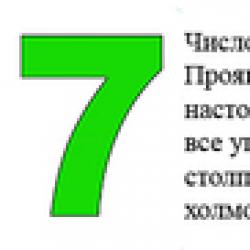“Because” where to put commas? Spelling “because” Not difficult because
Because … Spelling dictionary-reference book
In order that, in order that, zane, then that, for, from the fact that, since, because. The process of normalization of Russian syntax was accompanied in Pushkin’s language by various experiments on those Russian constructions that were... ... History of words
Cm … Synonym dictionary
Kyon Ki... Genre Drama Starring Salman Khan Kareena Kapoor Rimi San Jackie Shroff Suniel Shetty D ... Wikipedia
Because... Kyon Ki... Genre Drama Starring Salman Khan Kareena Kapoor Rimi San Jackie Shroff Suniel Shetty D... Wikipedia
BECAUSE, places. adv. and allied sl. For the reason that Mr. Why are you angry? Yes, it’s all the same. I don’t have time, I can’t come. Ozhegov's explanatory dictionary. S.I. Ozhegov, N.Yu. Shvedova. 1949 1992 … Ozhegov's Explanatory Dictionary
Conjunction Used when joining the subordinate part of a complex sentence, expressing the connection between the basis and the consequence; because. Ephraim's explanatory dictionary. T. F. Efremova. 2000... Modern explanatory dictionary of the Russian language by Efremova
because- because / because, union... Together. Apart. Hyphenated.
because- because, union... Morphemic-spelling dictionary
because- conjunction Syntactic constructions beginning with the conjunction “because” are distinguished by punctuation marks (commas). In this case, the first punctuation mark can be placed either before a compound conjunction or between its parts (before the word “what”). About the factors... ... Dictionary-reference book on punctuation
Books
- Because, Glattauer Daniel. It all started when Jan Haigerer killed a man. Just like that, without hesitation, he pulled the trigger of the gun. And from now on he is no longer the respected editor of a famous publishing house...
- Because, Daniel Glatthauer. It all started when Jan Haigerer killed a man. Just like that, without hesitation, he pulled the trigger of the gun. And from now on he is no longer the respected editor of a famous publishing house...
This is a fairly common phrase used to explain causes or phenomena. “Because” is a very simple expression at first glance. Moreover, it is replaced by other particles:
- because;
- due to this;
- because of.
These phrases help diversify your speech and make it more flexible. But there are times when the use of this conjunction cannot be avoided. The only way to always write it correctly, correctly highlighting it with punctuation marks, is to fully study the origin, rules, and spelling options. This approach will help you construct complex sentences correctly, and will make written and oral speech more educated and literate.
“Because” together or separately?
This phrase is a compound conjunction and a stable expression. Many people wonder how to write “because” together or separately? The most common mistake is to write this expression together. This is contrary to the rules of the Russian language. A hyphen between phrases and variations like “because” are not allowed.
“Because” connects the main and subordinate parts of the sentence. To check spelling, a question is asked for the subordinate clause. It must answer the question why. If posing such a question is logically possible, you need to use a two-word spelling (i.e. because). In situations where posing such a question is impossible, the expression is written in three words (i.e., by the fact that). In the second situation, this phrase is no longer a complex conjunction, but a combination of a preposition and a pronoun, as well as the conjunction that.
Because comma and spelling
Separating a conjunction with punctuation marks raises many questions. A comma before because can be placed either before a phrase or inside it, dividing the conjunction into two parts. It is mainly used to connect the main and subordinate clauses in a sentence. For example:
- “She doesn’t eat fried food just because she’s looking after her health.”
The main problem with spelling is the correct placement of commas. The distribution of commas determines what the author focuses on. The emphasis may be on the result or the cause. Examples:
- “He beat me because he trained more” (emphasis on results);
- “I don’t like cats because I’m allergic to them” (emphasis on the reason).
The desire to write because with a hyphen arises due to the similarity of pronunciation with the particle that, which is written with a hyphen with pronouns and adverbs. But because it is a compound conjunction and does not require a hyphen between the parts of the expression.
The division of a conjunction leads to a scattering of its components across different parts of the sentence. “Because” usually goes into the main part of the sentence, and “that” into the subordinate part.
When dividing a conjunction, it is therefore included in the main part of complex sentences. This is verified by asking a question. If the subordinate part answers the questions why exactly or for what reason. Example:
- “He started coughing and choking because he forgot his inhaler at home” (For what reason?);
- “The girl didn’t go to the theater with him because he doesn’t take care of himself” (For what reason?).
A conjunction must be divided into two parts if it is preceded by the particle not, there is an introductory word, or it is included in a parallel construction. Examples:
- They were friends not because he had a lot of money (not a particle);
- We bought the ticket only because this train ride promised to be exciting (particle for emphasis);
- She was sad, probably because of disagreements with her friends (introductory word);
- I love her because she understands me, and even more because she supports my endeavors (Parallel construction).
A compound conjunction is not divided if it is located at the beginning of a sentence. Such sentences are usually incomplete. For example:
- “Because I'm older”;
- “Because I respect her.”
Writing in English
The closest analogue of this expression in English spoken and written speech is because. In conversations it is also shortened to 'cause' or 'cos.' Another simpler analogue of the same phrase is for. This analogue has some limitations in writing. This particle is usually used not for explanation, but to provide additional information.
- This hunt shouldn’t take long, because our dogs found foutprints. – The hunt won’t take much time, because the dogs have scented the trail.
- The shouldn't stay in that house, because it's haunted. “They shouldn’t have stayed in this house because it’s cursed.”
- She was a little nervous, for it was the first time she stayed with his sister - She was a little nervous because it was the first time she was left alone with his sister.
- We took a cab for it was rather late.
In writing in English, these particles are separated by commas just like in Russian. This applies to both the for particle and the because particle.
You need to know the spelling of these words.
because or because
How to spell it correctly?
The word “because” is always written separately - because .
Word writing rule
To understand how this expression is written, let's figure out what parts of speech it consists of.
Expression " because" is nothing more than a complex conjunction.
We can explain the erroneous version of the continuous spelling by the fact that this expression is well known to everyone. And since it is pronounced in one breath, you want to write it together. However, this is not correct.
Compound union " because" consists of two separate words " That's why" And " What" Some manage to insert a hyphen between them, confusing the last conjunction with the particle “ That" In some sentences, depending on the context, this phrase must be written in three separate words. For example: A woman's character can be judged by what she has in her purse. In such cases, the expression " because"presented as a preposition " By", pronouns " that" and the union " What».
In order to distinguish two different expressions, one must ask the question “why?” If a sentence with a phrase gives the answer, then it is a compound conjunction, which is written in two words. If the answer is no, then this is a phrase that should be written in three words. It is also very important to correctly highlight this conjunction in the letter.
There are a number of rules about where exactly the comma should be placed. Briefly they can be described as follows:
- if the essence of the sentence is focused on the reason, then a comma is placed before “ What»;
I haven't rested for a long time because I have a lot of work.
- if on the result, a comma is placed before “ That's why»;
She liked you because you acted naturally.
In all cases the expression " because" is written separately.
Examples
- I didn't come to you because I was already late.
- We never pick mushrooms in the forest because We just don't eat them.
- Alena walked in the park all day, because I didn't want to go home.
It is correct to write the conjunction because in two words, and the phrase preposition + pronoun + conjunction is separately in three words.

Spelling
Difficulties in writing arise due to the fact that this conjunction is a derivative. That is, it is formed by combining two bases. Such words are often written together to avoid complete homonymy with the stems that produce them. These are, for example, also - the same, so that - whatever, but - for that. To correctly resolve the issue of how to spell because, you need to dwell on the following points.
- If you look at the derived lexemes of the type too, also, which changed their spelling to merged as a result of the word formation process, you will notice that they come from monosyllabic words. Long lexemes are much less likely to merge into one whole. In the adverb because, from which it comes because, there are two syllables. The adverb itself is already formed by merging the preposition by and the pronoun that, written together. Further addition of another root would be redundant from the point of view of the Russian language, where there is a strong tendency to save linguistic resources. Therefore, in the question of how to write: because or because, it is correct to give preference to the first option and write the word separately.
- Another possible option is to write with a hyphen. In the case of because, the desire to write with a hyphen arises from an analogy with for some reason, however, from the point of view of spelling rules, there is no reason for this. “Because” does not contain the particles either, either, or, which should be written with a hyphen.
- It is worth remembering that under the influence of pronunciation you can make a mistake in the second part of the word. The correct spelling is that, although it is pronounced [shto].
Thus, a compound derivative conjunction is always written separately, with the letter h.
What parts of speech can the word because
However, when you see “because”, you should not automatically determine the part of speech of this word. There are two options here:
- Because it is part of the union. For example: I was late because I forgot to set my alarm.
- Because - adverb. For example: The weather was good, so I decided to walk to the stop.
To determine the partial identity in each specific case, you can use the table
| action | Part of the union | adverb |
| Is it possible to ask a question because? | Can't be set. The question is asked to the entire subordinate clause | Answers the question: Why? |
| In what sentence is it used? | Complex with the meaning of cause | Most often – non-union with a hint of investigation |
| What is it used for? | Is a means of communication | Has an adverbial grammatical meaning |
| Can it be removed from the offer? | No. The meaning will be lost | Yes |
| Look at neighboring words | The second part is definitely next to you: what how | Could be standing nearby and, a. Or they can be inserted without changing the meaning of the statement |
| Replace with synonym | Since, because, due to the fact that, due to the fact that, due to the fact that, due to the fact that | Therefore, therefore |
When is it correct to write in three words?
Another problem is the distinction between a conjunction and a homonymous construction consisting of a preposition, a pronoun and a conjunctive word. The correct spelling in this case is separate: according to the fact that.
This design is characterized by the following properties:
- You can ask a dative case question for a pronoun: Why?
- What– a relative pronoun that acts as an allied word. It can be replaced with a noun suitable in meaning, and it can be determined which member of the sentence it acts as.
- The subordinate part has an explanatory meaning, not a causal one, that is, it explains the word “by that” from the main one.
For example: Returning from war, a soldier walked through what had once been a beautiful city.
Walking on what?- That's why. From the context it is possible to replace with a noun: over the ruins, the ruins of what was a beautiful city. A conjunctive word that acts as a subject explains the pronoun "That" from the main part.
Punctuation in sentences
To decide where to place a comma in a because clause, you need to consider the following punctuation rules:
- A comma is placed before because, at the junction of two grammatical bases in a complex sentence. The student was unable to complete the task because he listened to the teacher's explanations.
- When because comes at the beginning, there is no comma, as this is usually an incomplete sentence. Such designs are used by writers to achieve the artistic effect of emphasis. This technique is called parcellation. For example: Let this person urgently fly to Moscow. Because they are waiting for him at Vnukovo airport. It's been almost two years now. It is inappropriate to use such a technique in business writing.
- A comma is placed between because and that, if:
- Therefore there is a negation before it. People love Russia not because it is a big and strong country.
- The word is therefore highlighted with the help of particles (only, only, precisely), or it is preceded by introductory words (probably, perhaps, of course). Sasha was afraid of heights, probably because as a child he climbed a tree and for a long time could not come down from there.
- The logical emphasis falls on it. The correct placement of signs depends on the purpose of the statement. If the speaker’s task is to emphasize the reason for what happened, then you can rearrange it, a comma is placed between the words. I love spring because everything around me changes. Here the emphasis is on the reason for loving spring; therefore it is possible to rearrange: That's why I love spring... If it is more important to indicate the result, the punctuation mark is placed before because: My friends love summer, and I love spring, because everything around me changes.
- Therefore it is included in a homogeneous series. Sonya was scared because of the gunshots, the sounds of breaking glass, screams and because her father still had not returned home.
- In sentences where the construction is used, a comma should be placed before that. By what a person says about other people, one can draw a conclusion about his upbringing.
Because
In order that, in order that, zane, then that, for, from the fact that, since, because. The process of normalization of Russian syntax was accompanied in the Pushkin language by various experiments on those Russian constructions that were rejected by Karamzin and his school. Thus, Pushkin tests the stylistic possibilities of some old conjunctions and determines the range of their application in the variety of stylistic variations that developed in the Russian literary language in parallel with the formation of a solid norm.
For example, Pushkin revives the Old Russian Union in advance, giving it a place in stylizations of Old Russian speech and in ironic parodies of business language.
In “Boris Godunov”, in Pimen’s speech:
And everyone around was filled with fear,
Having understood the heavenly vision,
Zane holy lord before the king
I was not in the temple at that time.
In the poem “On the pictures to “Eugene Onegin” in the “Nevsky Almanac””:
Tatyana crumples a piece of paper in her hand,
Zane Her stomach hurts.
Wed. then in Baratynsky’s poem “To the Death of Goethe”:
I rested peacefully in advance committed
In the earthly limit everything is earthly.
In N. M. Yazykov’s poem “K. K. Pavlova" (1839):
And I sang to you, and you favored
Poems to cheerful young men:
Zane then they were strong and sweet-sounding
My poems: thank you!
In Samson:
In the arms of bliss she put him to sleep
Delilah cut his curls:
Zane they contained his wondrous power,
Which is not given to anyone.
Belinsky later wrote in a review of “Poems of Apollo Grigoriev” (1846): “Grigoriev loves to use the word in advance, and it comes out extremely awkward for him. This word was introduced by Pushkin, but he used it only once in “Boris Godunov,” very cleverly, by the way, and on the spot. Then Baratynsky used it in his beautiful poem “On the Death of Goethe,” but it also came out not entirely out of place. No one else used this word. It is good for poetry, replacing book for because and prosaic
Pushkin redistributes the functions of unions, diversifying and expanding their stylistic shades. Thus, in connection with Belinsky’s remarks, it must be emphasized that the prosaic union because(as well as because of) is introduced by Pushkin into various genres of poetic speech. (True, earlier in the fable verse language (for example, in Krylov) the following causal conjunctions were encountered: in order to, then what, because of, because, How). For example, in “The Bronze Horseman”:
Often coachman's whips
He was whipped That's why
What he didn't understand the roads
Never again...
In the poem “Lush City, Poor City” (1828):
Still, I feel a little sorry for you,
Because here sometimes
A little leg walks
A golden curl curls.
Wed. in the poem “On the Hills of Georgia”:
And the heart burns and loves again - that's why,
What it cannot help but love.
It is clear that in Pushkin’s language the stylistic fluctuations characteristic of that time in the use of conjunctions are extremely acute. Pushkin tests the viability of fading alliances.
For example, union in order to in a causal sense, it begins to die in the 10-20s of the 19th century. True, he found a place for himself in both dictionaries of the Russian Academy, derivative (1790, 2, p. 686) and alphabetic (1809, 2, p. 91). According to its compilers, it “means the same thing as because, more gently, This word was introduced by Pushkin, but he used it only once in “Boris Godunov,” very cleverly, by the way, and on the spot. Then Baratynsky used it in his beautiful poem “On the Death of Goethe,” but it also came out not entirely out of place. No one else used this word. It is good for poetry, replacing book: “I could not carry out your orders, in order to became sick." Academician Sukhomlinov noted cases of the use of this conjunction in the learned syllable of the “Grammar of the Russian Academy” (3rd ed., 1819). But Karamzin and his successors refused to use this union in order to avoid homonymy with the union in order to. The point is that the pretext For in the language of Karamzin and his school, it decisively changed its old meanings under the influence of the French pour and German zu. New range of preposition meanings For could not but affect the fate of the union in order to. N. I. Grech in his review of “Academic Grammar” stated: “The expression for that means not a cause, but a consequence, for example: he learns grammar for that, to know her" (see Sukhomlinov, issue 8, pp. 202-203; cf. Son of the Fatherland, 1819, part 55, XXIX XXXI XXXII XXXIII; cf. Grech himself in “Trip to Germany” - when stylizing the speech of XVIII V. (1830): “The black outfit is after my heart and for that, What it’s like a funeral dress for the princess”). Therefore, the causal union in order to is supplanted by the homonymous conjunction target for that, to. But Pushkin demonstratively combines both of these unions in the poem “Spell” (1830):
I'm not calling you for that,
So that reproach people whose malice
She killed my friend
Il so that to know the secrets of the tomb;
Not for that, What Sometimes
I'm tormented by doubt... but sad
I want to say that I love everything
That I am all yours; here, here!
(Compare Krylov’s fable “The Siskin and the Hedgehog”:
The timid siskin chirped to himself at dawn
Not for that, to he wanted praise;
And you're welcome; so something was sung.
Wed. also from Lermontov in “The Spaniards”:
Fernando:
Leave them to die of hunger, for that
What there is no cross on the poor man's neck).
Wed. from V.F. Odoevsky in “Beethoven’s Last Quartet”: “To him (the poet. - V. V.) it is sometimes useful to descend to external nature, although for that, so that to be confident in the superiority of one’s inner, and also for that, What“To the shame of man, the letters in the book of nature are not so changeable, not so vague, as in human language.”
So, the formation of a national norm of literary expression in Pushkin’s language was accompanied by a stubborn struggle between old and new elements of literary speech, a revaluation and stylistic transformation of old grammatical norms and forms.
(Vinogradov V.V. Pushkin and the Russian literary language of the 19th century // Pushkin, the founder of new Russian literature: Collection of scientific research works, M.; L., 1941, pp. 573-575).
V. V. Vinogradov.
History of Words, 2010:Synonyms
Because … Spelling dictionary-reference book
Cm … Synonym dictionary
Kyon Ki... Genre Drama Starring Salman Khan Kareena Kapoor Rimi San Jackie Shroff Suniel Shetty D ... Wikipedia
Because... Kyon Ki... Genre Drama Starring Salman Khan Kareena Kapoor Rimi San Jackie Shroff Suniel Shetty D... Wikipedia
See what “because” is in other dictionaries: Because!... (foreign language) there is a reason; I don’t know why, but it turns out this way (about the inexplicable). Wed. Why love the unworthy? Why? This question, princess, has not yet been resolved by any philosopher in this world. You love, you know, wie der Vogel singt... ...
BECAUSE, places. adv. and allied sl. For the reason that Mr. Why are you angry? Yes, it’s all the same. I don’t have time, I can’t come. Ozhegov's explanatory dictionary. S.I. Ozhegov, N.Yu. Shvedova. 1949 1992 … Ozhegov's Explanatory Dictionary
Conjunction Used when joining the subordinate part of a complex sentence, expressing the connection between the basis and the consequence; because. Ephraim's explanatory dictionary. T. F. Efremova. 2000... Modern explanatory dictionary of the Russian language by Efremova
because- because / because, union... Together. Apart. Hyphenated.






